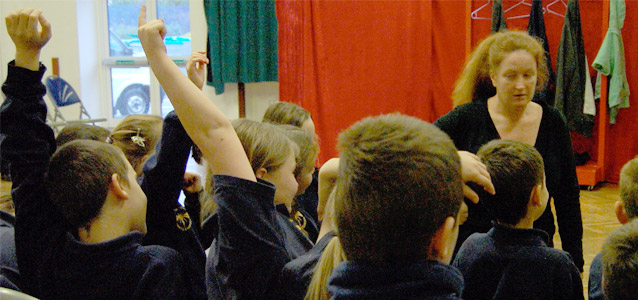
Creative Drama Projects
State of Play combines elements of role-play, storytelling and drama to enhance learning across the curriculum.
Our creative approach using special artifacts will stimulate all learners and develop subject knowledge, motivation and skills in:
- speaking, listening and writing
- social and emotional literacy
- cognitive reasoning and problem-solving
Key Stage 3
Programmes include:
After hearing the story, children are given roles as animals to evaluate the bad behaviour of the jealous rabbit in the story. Finally, through forum theatre they work towards a positive solution of the problem.
Teachers have used this programme as a way of tackling bullying in school at one remove.
Cultural Diversity and Inclusion Workshops
This popular Citizenship programme is a modern story, dramatising the plight of child labourers and street children in India and Africa. Children watch a short introductory performance before taking part in drama activities to develop their understanding and knowledge about relevant global issues.
Enhancing History through Drama
- Enkales
- Slave to the Athenians
- Julius Caesar
- Queen Elizabeth I
- Isaac Gulliver and the Dorset Smuggler
- At Home with the Russell-Cotes
- Gallileo
KS4 & beyond
For young people over the age of 15 years
Programmes include:
A two or three hour session that includes:
An accessible talk about the principles and practice of theatre in education with different age groups, illustrated by DVD clips and photographs.
A practical workshop exploring:
- how to devise a short themed piece, exploring a relevant social issues
- how to structure inter-active phases for audiences, exploring the story further though techniques such as hot seating, thought tracking and forum theatre.
- Drama with disaffected and reluctant learners (a course of 5 workshops)
State of Play facilitators work with a team of mentors engaging young people through story drama and enabling them to get in touch with their own creativity.
Each course ends with an informal sharing of a piece of theatre created by the group.
Experience and research indicates this has an empowering and positive effect on participants.
Previous projects have led to participation in university conferences and in international festivals of the arts.
“For the first time we created something good instead of destroying everything”
– Previous young participant
Using extracts from The Caucasian Chalk Circle, students explore key Brechtian ‘alientation’ concepts and techniques in a challenging but accessible ‘fun’ way.
The workshop includes:
- acting exercises that voice, movement and gesture;
- mask-work to explore ways of presenting the ‘essence’ of a character;
- speaking Brecht’s words in a range of non-naturalistic styles;
- watching a professional actor perform as Azdak;
- hot seating and thought tracking the character, in order to develop understanding of his significance in the play;
- reflection on the themes and meanings behind the play.
For example:
1Invisible Theatre
Two actors motivate students to explore the power of poetry through a simulated debate responding to a controversial poem by Michael Rosen about Palestine.
Students are drawn into a detailed exploration of the issues, having to read the poetic language carefully to back up their responses.
“This is the first lesson that made me speak out loud” Year 10 student.
2Who am I? What is my culture?
Students create their personal map, illustrating and celebrating their own name and cultural background, interests before writing acrostic poems about their lives.
3After Aunt Julia
This workshop aims to help students see how poetry is not an abstract list of words but a way of capturing and making sense of real, heart-felt memories.
It includes:
- A selection of carefully chosen audio-visual images and artifacts stimulating students to write lists of words to describe a elder member of their own family;
- A reading of Norman McCaig’s poem Aunt Julia, focusing particularly on his use of imagery.
- Hot seating the facilitator in role as the poet, describing his thought processes when writing the poem;
- Working in small groups to illustrate each of the key verses through a still Image;
- Sharing the Still Images.
- Revisiting their own lists to create their version of Aunt Julia, using McCaig’s verse forms.



